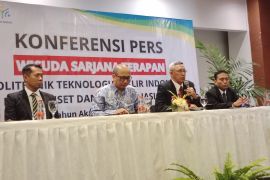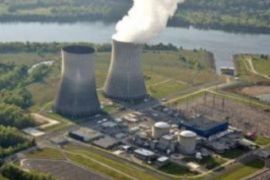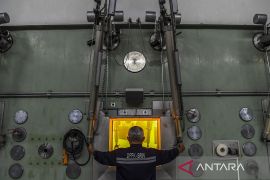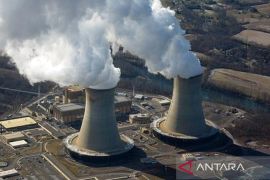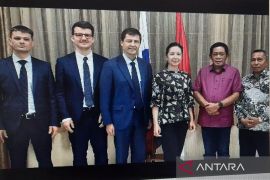Despite the opposition from various activists at home, the establishment of a nuclear power plant in Indonesia is inevitable because the country needs to have sufficient power supply to support its growing industrial sector.
Therefore, Research and Technology Minister Gusti Muhammad Hatta dismissed concerns that the presence of a nuclear power plant in the country would compromise the safety and security of Indonesian people.
He noted that the Chernobyl and Fukushima nuclear disasters in Ukraine and Japan, respectively, were because of "the use of old technology."
"The nuclear reactor that exploded in Fukushima was based on old technology. There was no such problem with the other reactors there, which were based on the new technology," the minister explained.
Although the Fukushima Daiichi nuclear disaster has prompted a rethink on nuclear energy policy in many countries, Gusti noted that Indonesia had enough experts who were capable of managing a nuclear power plant.
"We have many experts and therefore can definitely manage a nuclear power plant," he continued.
"Some people have rejected the presence of a nuclear power plant because they are afraid, while there are others who perhaps do not want Indonesia to make progress," Gusti stated.
Therefore, he said, the Ministry of Research and Technology would ask the experts to try and understand why the public was against the establishment of a nuclear power plant in Indonesia.
According to Gusti, Bangka-Belitung is the most appropriate place for setting up a nuclear power plant because of its proximity to Sumatra island.
"A nuclear power plant will also support the government`s policy of balancing the use of fossil and non-fossil energy sources," he pointed out.
"If we continue using coal the way we have in the past, it will run out in three years," he added.
Meanwhile, Indonesian Nuclear Energy Supervisory Board Chief As Natio Lasman called on the public to "not reject the idea of a nuclear power plant on the grounds of safety".
"There are three factors that need to be considered in the nuclear realm, namely security, safety, and peace," he said, adding that nuclear safety was the same around the world.
Speaking at the Forum for Nuclear Cooperation in Asia (FNCA), held in Jakarta on November 23-24, Gusti said nuclear technology had been proven to contribute to Indonesia's development.
Seventy representatives from 12 countries attended the forum to discuss the use of nuclear technology in many industries, ranging from electricity generation to agriculture and healthcare.
According to National Nuclear Energy Agency (Batan) Chief Djarot Wisnubroto, the forum was initiated by Japan and was attended by representatives from Japan, Indonesia, Australia, Bangladesh, China, Kazakhstan, South Korea, Malaysia, Mongolia, the Philippines, Thailand and Vietnam.
"At the forum, Japan stated how it dealt with its nuclear power plant disaster in Fukushima - from both technical and social perspectives," he said.
"From a technical point of view, Japan explained how it dealt with the leakages in the plant and how it cleaned up the areas contaminated by radioactivity. And from a social point of view, Japan revealed how it restored public confidence after the incident," he said.
Plans to develop nuclear energy in Indonesia have long been in the pipeline, dating back to the Suharto regime.
The first plan was to build one at the foot of Mount Muria in northern coastal area of Central Java. However, the plan was dropped later due to strong opposition from the local people.
Since then, Indonesia's plans to use nuclear energy were put on the back burner.
Then in 2011, Minister for State Enterprises Dahlan Iskan announced that he had approved a plan to build the country`s first nuclear power plant for meeting the rising energy demand in Indonesia.
"The nuclear issue has always triggered controversy in the country, but the plan to build a 200 kilowatt nuclear power plant must be implemented now," he said.
Dismissing concerns over the dangers posed by radiation, Dahlan pointed out that the recent radiation leakage at the Fukushima Daiichi nuclear power plant in Japan had not killed anyone.
According to 2012 survey results in connection with the plans to set up a nuclear power plant in Indonesia, 52.8 percent of the country`s population were in favour of setting up a nuclear power plant, while 24.3 percent were opposed to the proposal, and 22.9 percent remained neutral.
Meanwhile, the head of Evaluation and Documentation Center for Nuclear Science and Technology Dissemination, Dedy Miharja, said in Pangkalpinang, Bangka-Belitung, recently that nuclear energy was a safe solution to address global warming issues because it was environmentally friendly.
"As an alternative energy source to fossil fuels, nuclear energy is environmentally friendly because it does not cause pollution," he noted.
Compared with fossil fuels, Dedy continued, nuclear energy is cleaner because it does not emit dangerous gases such as carbon dioxide, sulphur dioxide, and nitrogen dioxide.
"It is estimated that every year, 25 billion tonnes of CO2 are released into the atmosphere, causing the greenhouse effect, which ultimately leads to global warming," he pointed out.
According to Dedy, nuclear energy is considered environmentally friendly because it is able to reduce carbon dioxide emissions, which are produced by burning fossil fuels. In addition, plutonium nuclear waste can be stored and reused as fuel.
"In developed countries, plutonium is stored and reused as fuel, or as one of the basic components of nuclear weapons. Our nuclear energy development will not be for creating weapons; we will only use it as fuel," he stated.
Dedi said feasibility studies, which started in South Bangka and West Bangka districts in 2011, in connection with the construction of a nuclear power plant, were "in the final phase."
(KR-BSR/O001)
Reporter: Otniel Tamindael
Editor: Jafar M Sidik
Copyright © ANTARA 2012
